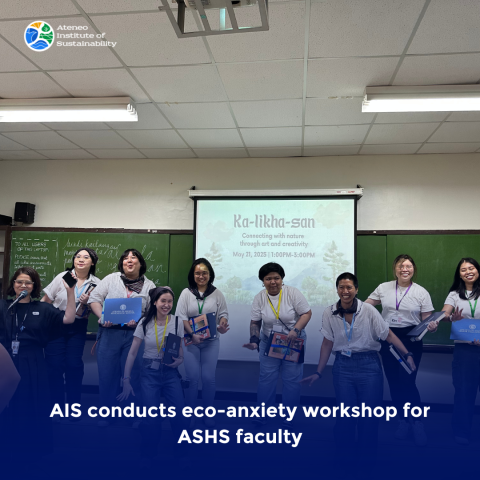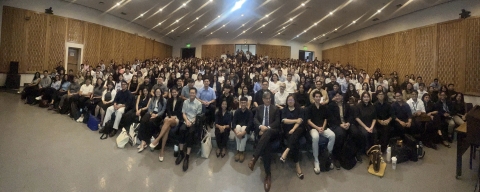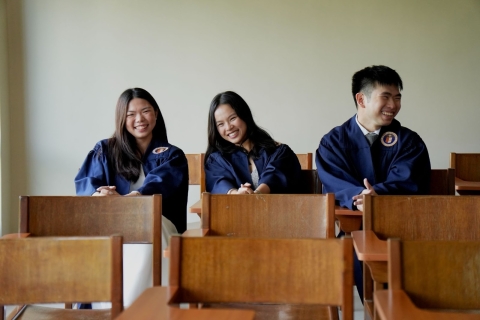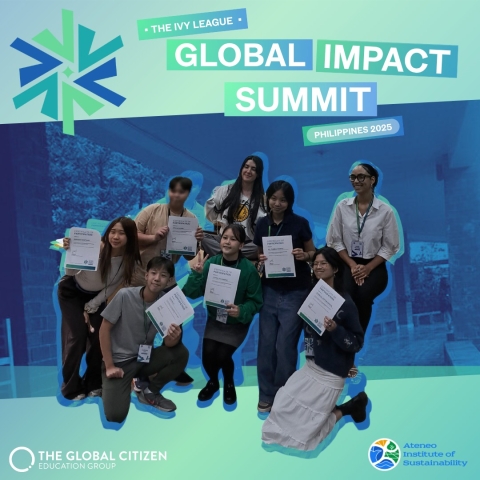Discerning the Present to Prepare the Future of the University Education of the Society of Jesus
20 Sep 2022 | Father General Rev Arturo Sosa SJ
The International Association of Jesuit Universities (IAJU) Assembly 2022 held from 3-6 August, was attended by nearly 400 presidents, faculty and administrators from Jesuit institutions and organizations across the world. The event, hosted by Boston College, focused on the theme "Discerning the Future of Jesuit Higher Education" which ties in with the theme of the previous IAJU Assembly held at the University of Deusto in 2018: "Transforming Our World Together".
One of the outstanding moments of the event was the speech of Father General, Rev Arturo Sosa SJ, who delivered his address in Spanish.
Father Sosa offered on August 4th at the IAJU Assembly a speech that emphazised the context of today's world, offering a meaningful Ignatian perspective for all members of the university communities, oriented towards the exercise of the Common Good.
Assembly of the International Association of Jesuit Universities (IAJU)
DISCERNING THE PRESENT TO PREPARE THE FUTURE
OF THE UNIVERSITY EDUCATION OF THE SOCIETY OF JESUS
Boston – August 4, 2022
With deep gratitude we can meet again after four years. Heartfelt thanks to those who have prepared this assembly with dedication, perseverance, and wisdom, and to Boston College, which welcomes us as sisters and brothers, taking care of all the details.
We have witnessed profound transformations in humanity during the four years that separate us from the Bilbao Assembly of 2018. We find ourselves in another stage of history, a stage that we sense but do not yet see with much clarity. We try to describe it as a “change of epoch,” “the knowledge age” … because we perceive the depth of the changes that are underway in all dimensions of human life. The transformation came without giving us time enough to understand what was happening, much less to prepare ourselves adequately.
At the same time we continue to experience in the daily life of the universities the tensions inherent in what they are. Tension between academic excellence and the integral formation of persons. Tension between rising to the demands of the day in infrastructure and technology and offering a quality education without any sort of social discrimination. Tension between the history, the tradition that has made the institution what it is, and the challenges of the present crisis that open up an uncertain future. These and many other tensions fill the minds, the hearts, and the daily work of those who have come together here.
This worldwide assembly has been proposed as an opportunity to discern in common the specific contribution of the institutions of university education under the responsibility of the Society of Jesus in the present moment of human history. What specifically they can be and do to help pave the way to a more just society with fraternal relations among persons, their cultures, peoples, and nations. So that the common good orients the decisions of global political economy. So that we move toward reconciliation with the environment, reestablishing an equilibrium in the use of natural resources that promotes not only the full life of all human persons but also life itself on planet Earth.
We seek a discernment that leads to shared decisions about what characterizes the universities, colleges, institutes and faculties that are members of this international Association. In other words, we seek to answer the question of what is particular to our institutions, what is that “special” or “unique” quality that characterizes their mode of inserting themselves in the present moment in the construction of the desired future.
We can ask the same question from another perspective: what can motivate a person or a family to choose to study, teach, do research or work in a university that belongs to the International Association of Jesuit Universities (IAJU)?
- To prepare the future requires discerning the present
We run the risk of converting discernment into a comfortable label attuning us to a language that makes Jesuits smile and is music to the ears of Pope Francis. In fact, discernment requires accepting challenges that come to us from many angles of social life and from the sciences, challenges that often frighten us, with good reason.
To discern implies risk … Risk-taking does not arise naturally from the dynamic of institutions that with great effort have constructed an identity, a successful way of educating and generating knowledge, a success that makes them proud and that is recognized in the circles in which they move and enjoy great prestige. To discern is to open oneself to something new.
The newness to which we open ourselves through discernment is radically different from the innovation that comes from scientific research or technological progress. It is a newness that is given to us, that does not follow from premises that we ourselves have put into place or from steps that we have taken along paths that we have chosen, designed, and constructed.
To discern, therefore, is to dispose oneself to be guided toward something new. It implies “letting go of the reins” to be led toward a destination we do not know, without relying on a road map that guides our steps. The characteristics of university institutions make it especially difficult to “let go of the reins.” The institutions are designed to hold the reins firmly in hand and to control the road that is taken and the pace of movement.
To propose discernment in common as the way to face the future requires that we become aware of the resistances derived from the customary university dynamic. It requires consciously conducting a complex process to change the focus and the habitual ways of making decisions, avoiding the temptation to put the label “discernment” on what we already do because we are accustomed to it and it has gone well.
We have just closed the Ignatian Year 2021-2022. We have sought inspiration in the experience of Ignatius of Loyola in order to let go of the reins of our own lives, to be able to open ourselves to what is new, to see all things new in Christ, to allow ourselves to be led to new horizons. Ignatius applied to himself the image of the pilgrim. Following the same inspiration, we can imagine the IAJU, or better, the entire life-mission of the Society of Jesus, on pilgrimage, as a body with many members with different and complementary functions, taking to the road trusting in the Spirit that began the Society, guided it for hundreds of years, and promises to continue to guide it if we “let go of the reins.”
From the faith that inspires the life-mission of the Society of Jesus and that opens us to work in harmony with many other persons and institutions that connect with it from other life choices, we know that the Holy Spirit guides through a particular way of acting in human history. The Spirit guides like a master who freely accompanies the processes of the disciples, respecting their liberty, following their processes patiently, adapting himself to the conditions of each place, moment, and person. The Spirit guides through what we might call the pedagogy of grace, opening our senses to the signs of the present that lead to the future object of our hope and our effort.
The “signs of the times,” those signs that the Spirit gives with its action in history, are made manifest in the present. To learn to read the signs of the times is the discernment of the present that sheds light on the path to the future, a future that will be given to us if we elect to follow the path to which the signs point us.
A future consistent with the reason for being of the universities and educational institutes entrusted to the Society of Jesus requires, therefore, a careful discernment in common of the present. In this assembly we seek to move in that direction, examining the path traveled by the Association in the past years, deepening awareness of its necessity and committing the best available means to its realization.
The members of the IAJU are called to discern from the ground of the identity that is their reason for being, the principle and foundation of their mission, and the bond that unites them. Many universities have been examining this identity in recent years. We have been invited to return to its sources during this Ignatian year. It is the same spring that fed the long and complex discernment in common of the universal apostolic preferences of the Society of Jesus, and it still flows to make fruitful the apostolic works that put the preferences into practice.
- Persons with a life full of meaning
The identity of the institutions of university education joined in the IAJU begins with an integral vision of the human being. Therefore, we conceive of the university not as fragmented but as integrated. We propose institutions that offer the possibility of integrating the diverse dimensions of scientific, educational, and social activities.
An everyday university life that embodies and transmits that identity is, without doubt, an enormous challenge that requires paying attention to how ordinary campus activities are carried out; to how that identity is cultivated in the members of the university community and especially in its professors and administrators; to how decisions are made; to what incentives are proposed; to everything that constitutes the “success” of the programs and processes that are undertaken.
Like the whole system of higher education in the world, our institutions of university education are constantly threatened by three strains of virus with highly contagious variants: fragmentation, superficiality, and instrumentality. The illness that these viruses produce threatens the identity that unites us, inspirited by the charism that Ignatius expressed by using the phrase “to help souls” as the goal of the Society of Jesus, desiring to serve the mission of the Lord entrusted to the Church. “To help souls” is the Ignatian commitment that leads to integral attention to persons in all dimensions of personal and social life and in all that they need.
It is urgent, therefore, to discern what type of person we imagine as the fruit of the university experience that we propose. This is the central matter of our discernment. The human person needs to find meaning in his or her life and actions, the great actions and the small ones of every day. We propose “to seek and to find” the style of research, social action, and university education that is able to initiate and accompany personal and social processes that give meaning to life in all its dimensions, moving toward life in its fullness.
The spirituality that flows from the charism of the Society of Jesus understands the full life to be one that always seeks “in everything to love and to serve.” That is how we conceive of “excellence.” Through discernment in common, we propose to animate institutions that are excellent because the people who work, do research, teach and study in them find the conditions to lead lives with meaning, lives that advance toward fullness.
Our university institutions are conceived in such a way that they offer space to accompany the processes of a great variety of persons who are living different moments of their lives, at the same time contributing, to the extent that they are able, to the transformation of the unjust structures of the societies in which they carry out their specific tasks as universities.
What we know as the “Ignatian pedagogical paradigm” is one of the most effective means to organize university institutions under our responsibility in accord with the identity that gives them meaning, the identity that leads them to offer opportunities to all their members to find the meaning of their own lives in relation to other persons and to the environment.
Those who are familiar with Ignatian pedagogy understand its close link with the Spiritual Exercises. In the Exercises Ignatius Loyola proposes a concrete way to experience the action of God in history and to discern the path to finding the meaning that makes life full. The widespread and responsible use of this precious instrument is, without doubt, within the reach of all our university institutions. Let us continue to use it, finding methods adapted to persons, times, and places. Let us take advantage of the experience to shape university spaces that incarnate the style proper to this identity.
One of the questions I often hear is this: is it necessary to share (Christian) religious faith to acquire the identity that is characteristic of our university institutions? In other words: does the path that leads to finding the meaning of personal and social life demand Christian religious faith?
The experience of our universities shows that full and meaningful lives are led by different persons with an amazing variety of personal religious, cultural, and political options… This is one of the signs to which the proposed discernment must pay attention. Humanity is the common substratum of all persons, cultures, religious experiences, beliefs… The substantive nucleus of human fulfilment is the love that becomes agape, love that is lived in common, gathering humanity around it.
- Sowing in thirsty soil
We experience in different ways the expansion of secular society as the space in which the immense majority of human beings live or will live. Some experience it as a threat, because processes of secularization have engendered bitter conflicts that have left deep wounds that are slow to heal and quick to reopen. Other environments have been totally captured by the principle that “anything goes” and suppose that it is enough to respect what each person thinks or feels in order to assure respect for my identity, ways of thought and religious faith. Vast sectors of humanity have been covered with the cloak of religious, ideological, or political fundamentalism leaving little margin to think differently or to dissent.
Some, therefore, perceive secular society as ground that is parched and broken after a persistent drought. The truth is that the soil is thirsty. It offers us an opportunity to cultivate a life full of meaning.
We can characterize a mature secular society as “thirsty ground” because it has overcome ideological extremisms, religious and cultural sectarianisms, the hegemony of the market and the market’s homogenizing dynamic that suppresses cultural diversity, depersonalizes, and relies on authoritarianism to sustain itself.
This thirsty ground is plural, with a wide range of different terrains and conditions suited to different and complementary crops. Secular society generates relationships that permit the exercise of human freedom in the different dimensions of life, opening spaces for human creation.
The mature secular society offers a new opportunity to live our identity and, from that identity, to make a significant contribution. Extending the image, we can water, sow, and cultivate in thirsty ground. The challenge for the discernment in common to which we are called at the present moment is to see clearly the signs of the opportunities that are opening to us in this new historical epoch.
Making the university a space of discernment helps to overcome the tendencies to fragmentation that exist in secular society. Our universities, located in the humanistic tradition of the pedagogy of the Society of Jesus, encourage processes that synthesize knowledge and integrate the dimensions constitutive of persons, societies, and the healthy relationship with the environment.
The humanistic tradition of the identity of our university institutions inspires the creation of knowledge through a multi-factored dialogue that includes the diversity of perspectives of all the disciplines that are cultivated in the university. This dialogue demands fluid and constant communication as a necessary means for building and maintaining the unity of minds and hearts that gives meaning to the institution. Equally, the transmission of knowledge as a fundamental dimension of the university’s task contributes to the formation of well-integrated persons, committed to the transformation of society, agents of reconciliation who struggle for social justice.
We have accepted the challenge of inspiring and directing university institutions able to overcome the fragmentation of specialized scientific knowledge, through inter- and trans-disciplinary dialogue, inserted in a social context in which they are actively present with a universal vision and with awareness of forming part of a single, rich and varied humanity.
- From the experience of intergenerationality and interculturality
We can recognize the richness, the risks, and the potential of the future in two fundamental characteristics of humanity today: the diversity of cultures and the variety of ages that form the human population. To preserve and benefit from this richness we must face two complex and beautiful challenges: to advance toward interculturality with a deeply-rooted awareness of intergenerationality.
Recognizing cultural diversity as a richness leads us to join with a current that bases an interconnected or globalized world on multiculturality as a fundamental characteristic of the world of today and tomorrow. The creation of culture is an essential element of humanity, showing its capacity to open itself to what is new and better. This current runs counter to the imposition of a single worldwide market that subjects all human beings to the same scheme of production and consumption.
Because “the world is our home,” as the first Jesuits said, every culture that dwells in it is our sister. That is why we want to go beyond multiculturality and open ourselves to interculturality as a process of human enrichment. The society in which we live is multicultural. So are our university communities. Interculturality is something more than the pluriculturality proclaimed by some of the nation states of the world. Pluriculturality recognizes the presence of different cultures in the territory of a state with laws that defend their existence and promote the coexistence of various cultures. This approach seeks to avoid the imposition of one culture over others in the same state or among nations as has occurred so many times in history and occurs even in our day in various parts of the world.
Interculturality, however, goes beyond the simple fact of persons of different cultures living together in a healthy coexistence. Interculturality begins with a step that is seldom clear and never easy. The first step is to develop a critical awareness of one’s own culture that, recognizing its gifts and limitations, goes out to meet other cultures, contributing what one is and being enriched by exchange with the other.
The advances of the modern epoch made it possible to prolong the life of human beings and avoid the risks of illness and death from infancy until old age. In most of the world, life expectancy is much higher now than in earlier centuries. Many generations live together now. Generations with a great diversity of perceptions of what full human life is, should, and can be. The diversity of perceptions easily leads to generational “gaps.”
The challenge of intergenerationality lies in the complex task of establishing an authentic dialogue within each generation and across generations. A dialogue that establishes spaces and conditions to listen to one another. A dialogue that, on the one hand, grounds fraternity among generations, and on the other is able to lead distinct generations to a commitment to seek the common good of humanity, including the reestablishment of a harmonious relationship with nature, with the environment and bio-diversity.
The member institutions of the IAJU -- and the Association itself – are multicultural spaces in which many generations live together. Let us take to heart the challenges of interculturality and intergenerationality as opportunities to enrich the institutions and the persons who form the university community. Let us make this immense richness a patrimony to improve our contribution to the common good of humanity, struggling to make this world a home reconciled in justice.
- The university, politics, global citizenship, reconciliation and peace
The proposal of universities that contribute to giving the full meaning to human life necessarily includes a political dimension. Through politics, meaning is given to social life. Drawing on the identity that grounds our university institutions, the integral formation of persons requires developing the citizenship of each person, of the university communities and of their institutions, expressed in a consistent commitment to the common good. As university institutions with local roots and universal vision, they are able to promote a global citizenship that works to overcome the great social gaps of today’s world. In these universities, research and the transmission of knowledge are understood as effective instruments to contribute to orienting the geopolitical dynamic toward reconciliation and justice.
The characteristic identity of Jesuit university institutions leads to finding meaning also in public life. It demands thinking seriously, in the dynamic of the Ignatian magis, about how to better contribute to the deepening and expansion of democracy, which is threatened today even in those countries in which democracy has a long tradition and, one would suppose, a deeply-rooted consciousness of democratic values as the basis of political stability.
A recent essay by Moisés Naím[1] asks this question: Do those of us who come from a “democratic culture,” convinced that citizens are the source of political power, governed by a system with checks and balances, understand the growing tendency everywhere toward autocracies that claim unlimited life-long power? Are we prepared for that?
I think I am not mistaken in affirming that the members of the IAJU are committed to political democracy and that you are also convinced that democracy needs the Humanities, because a democratic society seeks not only material prosperity but the integral development that comes from pursuing the common good.
We are witnessing a tendency that seeks to reformulate the basis of political legitimacy, diluting its democratic component. Naím classifies these forces as the three “Ps”: populism, polarization, and post-truth. They are expanding in the most diverse nations of the world to such an extent that this can be considered a tendency with hegemonic possibilities.
There have been many studies, discussions, and publications about how populism empties of meaning the authentic exercise of the will of the people, how it weakens popular and civic organizations, how it eliminates the function of political parties as channels of alternative ideological-political programs to be decided in free elections by the citizens of each country … Populism takes on a demagogic character that allows it to set aside the people in favor of the figure of an autocrat claiming to be the authentic interpreter of the will of the people and the only one who can implement the popular will through the use of political power.
Once power has been acquired, sometimes by taking advantage of the conditions of democratic regimes, the autocrat proposes to retain power indefinitely through the polarization of society and the support of followers who act like fans of a sports team. The autocrat is praised and defended in every circumstance, as fanatics defend the team they support forever. The discussion of ideas comes to an end because the autocrat expresses clearly the program of government and his word sets a course that cannot be doubted. His is the one voice and the one face of the government and of the state. The citizens and organizations that do not belong to his “fandom” are considered enemies to be neutralized or even eliminated.
The communications media strengthen this tendency when they focus political narrative only on the people who present themselves and act like the leaders of groups of fans. In doing so the media lose their character as mediators of political discussion and action. Development and expansion of so-called “social networks” has turned them into one of the most important ways of feeding polarized public opinion, displacing the mediating function of media like newspapers, magazines, radio and television that have a culture of balanced information, fact-checking, and verification of the authenticity of sources.
We face, then, given the characteristics and identity of our university communities, the question of how to enter helpfully into the world of social networks to convert it into one of the dimensions of the integral formation that we seek.
For the university that finds its reason for being in the systematic search for and diffusion of truth, it is a crucial challenge to confront the third “P” mentioned by Naím: the age of post-truth, of confused conceptualization and thought, of disinformation and the uncontrollable diffusion of fake news and conspiracy theories that distort reality.
Post-truth has such a capacity of manipulation that it can systematically block knowledge and diffusion of the truth about what is happening in the political arena. Post-truth converts the invention of reality into an instrument of domination and governance.
Autocratic regimes sustained by populism, polarization, and post-truth generate an atmosphere in which everything is always doubted except the word of the autocrat. The regime feeds uncertainty about what might happen in personal, family, or work life. Fear leads to political paralysis or to resignation in the face of what seems irremediable.
If at the same time the individualistic tendencies present in many cultures are exacerbated, then a stance against all politics can spread as an attitude toward public life. This is the most effective way to weaken the consciousness of citizenship, to lose the sense of actively participating in the search for the common good, and to expand the already grave threats to democracy.
As universities whose identity includes the commitment to the mission of reconciliation and justice, we have the enormous responsibility of helping to distinguish the truth from the falsehoods used to justify autocrats who present themselves as the only authentic defenders of the people. As exponents of democratic culture, we know that it is citizens who are aware, free, with contrasting ideas, capable of dialogue and of taking decisions within the horizon of the common good, who make possible the politics that leads to justice and fullness of life for all human persons, in harmony with the environment.
For our universities, the challenge of participating in public life and offering political formation to the members of the university community includes promoting governance based on truth, strong institutions, and the rule of law. We must contribute to a social environment that considers to be normal an ideological pluralism, a dialogue among alternative proposals. Above all, a commitment to create and maintain conditions that guarantee the possibility of alternation in the exercise of political power with scrupulous respect for the will of the citizens. In the international arena arrangements that permit the mutual defense of democracies and the diffusion of democratic culture should be promoted.
Remembering that our institutions depend for their operations on the generosity of benefactors, we should also recall that autocracies, and other powerful forces in many different social contexts, feed on dirty money coming from illicit activities or from corruption that turns public resources to private benefit. Many times they try to “launder” that money through donations to NGOs, charitable organizations, or institutions of social prestige. They might wish to include ours.
- With and for others
In recent years we have become more aware of the intrinsic relationship between the expression “for and with others”, which we use so frequently to express our identity, and the educational task to which we are committed. We want to work in institutions and to be persons who are “for and with others.” To do that, we must deepen collaboration in mission as an essential characteristic of our way of proceeding that follows from our identity.
Becoming a collaborator comes from hearing the call to participate in the mission of the Jesuit universities and electing to respond to the call as part of a body in which distinct vocations complement one another to contribute to the mission of Jesus Christ that has been entrusted to the Church, according to the charism of the Society of Jesus.
Collaboration is the way of proceeding of the apostolic body of the Society both within each apostolic work and among the different works that carry on the mission at the local, regional, and international level. Collaboration makes it meaningful to call ourselves a body and makes the body real in our daily life and work.
In the present moment of the history of the Society of Jesus we cannot even imagine educational institutions, or any sort of apostolic work, without plural teams in which people with distinct vocations of service join with the Jesuits. We also have experience with Jesuits collaborating in apostolic works initiated and directed by other institutions, groups, or persons.
What we understand as collaboration is a concrete way of living the ecclesiology expressed in the Second Vatican Council. The Church understands itself to be the People of God on the move, to which each person contributes according to his or her identity and talents. Collaboration is also a way to live universal fraternity and to labor side by side with people who, led by other religious beliefs, humanitarian options or desires to serve, join in working toward the same ends of reconciliation and justice. No one is superfluous. No one is expendable. We are all collaborators in the mission of Christ. That is a key dimension of our identity.
The collaboration characteristic of our identity includes the solidarity born of feeling ourselves to be brothers and sisters of all human beings, enriched by intercultural and intergenerational relationships, always ready to lend a hand to whoever needs it. Solidarity among persons and institutional solidarity are proper to our way of being and proceeding. Becoming men and women “for and with others” is the fruit of a well-educated solidarity. The university communities within our institutions are called to live that solidarity. They should be institutions with an organizational culture configured to that way of being and proceeding.
The International Association of Jesuit Universities finds it reason for being and the meaning of what it does in living and promoting collaboration and solidarity both within and outside the university institutions that form it. The goal is to take advantage as much as possible of the enormous potential for collaboration and solidarity that exists in the universities that form this network. We have started step by step down this path. As we go forward we recognize the advantages of collaboration and solidarity. We are learning better ways to benefit from the resources that we have, resources that always seem scarce given the magnitude of the task.
The desire of the Society of Jesus is that this assembly renew the creative energies of the members of the IAJU so that we can grow as institutions that form persons who are integral and integrated, able to discern the present as long as they live, and committed to the search for social and ecological justice.
In the name of the Society of Jesus, I ask you to accept a heartfelt word of thanks for your commitment to the complex task of the university in such different contexts throughout the world. Please carry that gratitude to your university communities and continue to help us to be a body able in all things to love and to serve.
Thank you very much.
Arturo Sosa, S.J.
Superior General of the Society of Jesus










